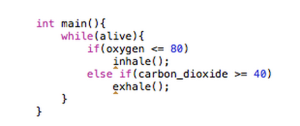This post is an op-ed from Stef Cohen, an engineering student at the University of Maryland. You might know her as the girl with the paint from Bitcamp.
Keep an eye out for Stef’s Art Hack tutorials!
Like a computer, your brain processes stimuli and outputs a response based on a series of conditional statements and loops encoded in your mind. It’s doing it right now. Sensors in the medulla oblongata are gauging oxygen and carbon dioxide levels in your blood. When they reach a defined upper limit, the medulla oblongata sends signals through your nervous system to the diaphragm, lungs, and intercostal muscles, causing you to exhale and inhale. In a sense, your medulla oblongata is doing something that looks like this:
Biology often inspires technology. Consider the process occurring as you read this article. The retinas in your eyes gather visual input and send the information as electrical signals through the optic nerve to the visual cortex of your brain. Not unlike a CMOS camera. The cells in your cortex are identifying the shape, color, and location of objects on your screen. Your brain then organizes and differentiates the objects into letters and then words, and finally into meaning. It then outputs a reaction in the form of a thought or emotion.
These “neural programs,” deep in the grey matter of your brain, follow the same basic Boolean logic you implement in code.The neurotransmitters and receptors responsible for things like emotion or curiosity can be mapped using the same AND, OR, NAND, and NOR logic symbols found in programming. Each key you press while writing code is the result of an incremental change in the x-, y-, and z-variables describing the position of your finger relative to the keyboard.
It probably sounds like I’ve been thinking about this for a long time, but I never actually had an interest in coding before January of this year. My friend and I partnered on a medical venture to build an ultrasound device and I needed to learn C. Yes, my first major coding project involved Fourier Transforms.
We joined a student-run startup incubator at University of Maryland called Startup Shell where I found myself surrounded by programmers and developers who were eager to help me learn. They exposed me to all the potential coding can have in your daily life outside of engineering for engineering’s sake, like web scraping to gather information or using APIs to build personal apps.
Diving headfirst into programming hasn’t been easy. I often get frustrated when I can’t find simple bugs or don’t even know where to start looking. When someone solves my problem with a basic technique, I have a tendency to feel a little humiliated. I’m always asking myself, “how is this so simple for everyone else?”
In moments like these, when I begin to feel completely incompetent in the field I’ve set out to make my own, I give myself this pep talk:
You are biologically predisposed to be a programmer.
Everything you perceive, everything you do, and everything that makes you exist is processed by code in your brain resulting in an action. Programs are a natural process by which you live your life and therefore, you have the potential to write code as impressive and intuitive as the code residing in your subconscious.
I just started learning my second programming language and I know there’ll be roadblocks, but whenever I feel doubt, there’s comfort in knowing that in a sense, the language is already encoded in my head somewhere. And then I keep on hacking.
